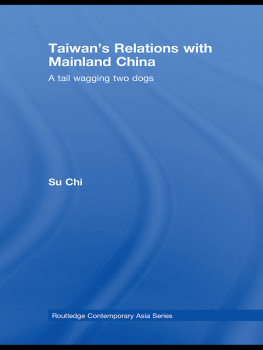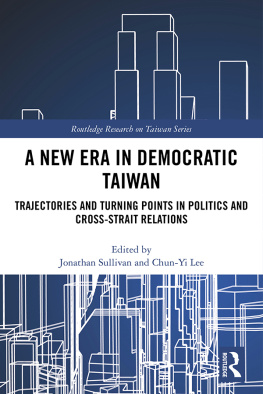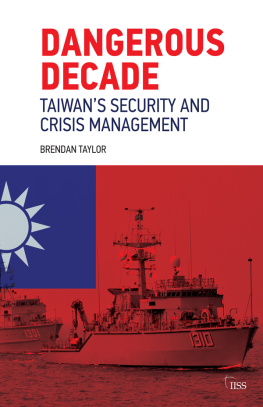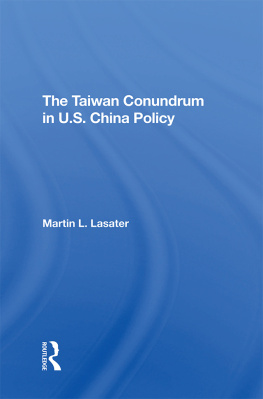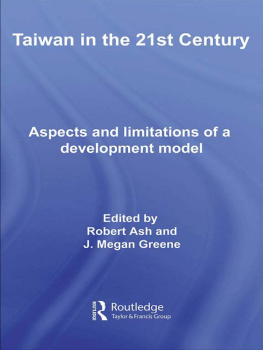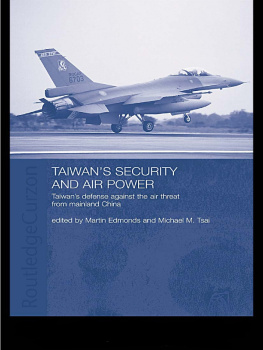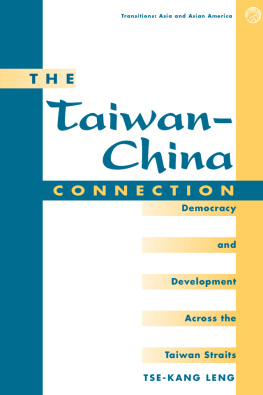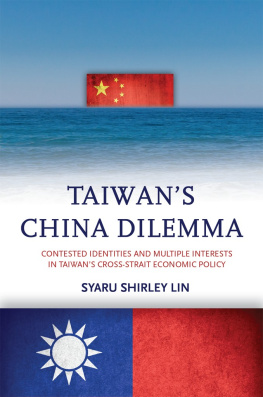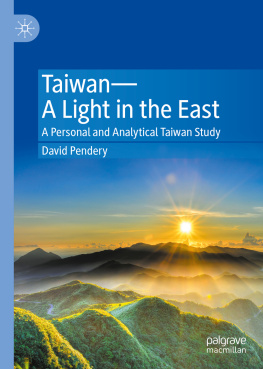Taiwans Relations with Mainland China
Taiwans Relations with Mainland China is the first book to deal with the role of Taiwans leadership politics, including the personal political styles of Lee Teng-hui and Chen Shui-bian, in the development of Taiwans mainland policy and the consequences for U.S.-Taiwan relations.
Including analysis of the critical and volatile 19882004 period, the Taiwan Straits crisis and cross-strait tension associated with the 2004 Taiwan presidential campaign, Su Chi weaves in his personal participation in Taiwan policy making during critical periods in Taiwans diplomatic history to provide insight and information on cross-strait relations that is not available elsewhere.
As a study of Taiwans mainland and US policy this will be a fascinating read for students and scholars of Taiwan Politics, Chinese Foreign Policy and East Asian Security studies alike.
Su Chi is currently Secretary General of Taiwans National Security Council and in 20052008 a Legislator in Taiwans Legislative Yuan and a co-Chair of its National Defense Committee. He formerly taught full-time at Chengchi University and Tamkang University. Between 19932000 he served in the ROC Government as cabinet-level Chairman of Mainland Affairs Council and Deputy Secretary-General of the Presidents Office.
Routledge Contemporary Asia Series
- Taiwan and Post-Communist Europe
Shopping for allies
Czeslaw Tubilewicz
- The Asia-Europe Meeting
The theory and practice of interregionalism
Alfredo C. Robles, Jr
- Islamic Legitimacy in a Plural Asia
Edited by Anthony Reid and Michael Gilsenan
- Asian-European Relations
Building blocks for global governance?
Edited by Jrgen Rland, Gunter Schubert, Gnter Schucher and Cornelia Storz
- Taiwans Environmental Struggle
Toward a Green Silicon Island
Jack F. Williams and Chang-yi David Chang
- Taiwans Relations with Mainland China
A tail wagging two dogs
Su Chi
Taiwans Relations with Mainland China
A tail wagging two dogs
Su Chi

First published 2009 by Routledge
2 Park Square, Milton Park, Abingdon, Oxon OX14 5RN
Simultaneously published in the USA and Canada
by Routledge
270 Madison Avenue, New York, NY10016
Routledge is an imprint of the Taylor & Francis Group, an informa business
This edition published in the Taylor & Francis e-Library, 2008.
To purchase your own copy of this or any of Taylor & Francis or Routledges collection of thousands of eBooks please go to www.eBookstore.tandf.co.uk.
2009 Su Chi
All rights reserved. No part of this book may be reprinted or reproduced or utilised in any form or by any electronic, mechanical, or other means, now known or hereafter invented, including photocopying and recording, or in any information storage or retrieval system, without permission in writing from the publishers.
British Library Cataloguing in Publication Data
A catalogue record for this book is available from the British Library
Library of Congress Cataloging in Publication Data
Su, Chi.
Taiwans relations with mainland China : a tail wagging two dogs / Su Chi.
p. cm.(Routledge contemporary Asia series)
Includes index.
1. TaiwanRelationsChina. 2. ChinaRelationsTaiwan. 3. Chinese reunification question, 19494. United StatesForeign relationsTaiwan. 5. TaiwanForeign relationsUnited States. 6. United StatesForeign relationsChina. 7. ChinaForeign relationsUnited States. 8. United StatesForeign relations2001 I. Title. II. Title: Tail wagging two dogs.
DS799.63.C6S8 2008
327.51249051dc22
2008008804
ISBN 0-203-89193-7 Master e-book ISBN
ISBN10: 0-415-46454-4 (hbk)
ISBN10: 0-203-89193-7 (ebk)
ISBN13: 978-0-415-46454-3 (hbk)
ISBN13: 978-0-203-89193-3 (ebk)
Tables
Summary of the nine secret meetings
Cross-strait consultations (199195)
Indirect cross-strait trade
Taiwan business investment in China (ROC statistics)
Taiwan business investments in China (PRC statistics)
Cross-strait interpersonal contact
Chinas defense spending: announced component (19902000)
KMT and DPP administrations presidential and vice-presidential, and premier visits to other nations (19892005)
KooWang meeting (1998)
A comparison of the DPP Party Charters Taiwan Independence Clause, the Resolution on Taiwans future, and the Two-States Theory
Chen Shui-bian on one country on each side
Chen Shui-bian on a new constitution and referendum
Chen Shui-bian on visiting the mainland
Chen Shui-bian on the three links
Chen Shui-bian on cross-strait trade
Trade between Taiwan and mainland China
Taiwan investment in mainland China
Lee Teng-huis and Chen Shui-bians National Day Speeches (19882005)
Poll results leading up to the 2004 presidential election
Popular assessment of the fairness of the three presidential elections
Acknowledgments
This book grew out of a Chinese-language book, Weixian Bianyuan:Cung liangguolun dao yibian yiguo (Brinkmanship: From Two-States Theory to One-Country-on-Each-Side), I published in December 2003 in Taipei. Some parts of that book were simply translated into English for this book, but other parts were substantially revised, and all were newly footnoted. To extend the coverage to include the controversial year of 2004, two new chapters and a new Conclusion were added at the end.
The research, writing and rewriting were conducted mostly in 2005 and 2006 when I served in Taiwans Legislative Yuan as a party-appointed legislator. But from the very beginning of its Chinese-language sister book, both were never intended as political memoirs or even campaign books. I merely attempted to share my understanding, rightly or wrongly, of the ChinaTaiwan relationship from an insiders perspective, first in the KMT administration (19932000) as a vice minister, minister and deputy secretary general of the Presidents Office and then as a legislator (20052008), as well as from an outsiders viewpoint as a university professor before and in between the two periods of public service.
In many ways I am an extremely fortunate person. If my pregnant mother had not moved to Taiwan from the Chinese mainland with my father in 1949 and gave birth to me there, I would most certainly have suffered the ill fate that had befallen the children of many former KMT soldiers in the mainland. Had I been lucky enough to survive wave after wave of political purges and economic disasters over the following decades, I would definitely have grown to be a Red Guard during the turbulent Cultural Revolution (196676) and banished at some point to the poor and backward countryside for the rest of my life. I would never have had a chance to grow up uneventfully and receive uninterrupted and well-rounded education in Taiwan and to leap from Taipei in the 1970s to Washington, DC, New York and Boston where I met and learned from many excellent teachers and colleagues.
After my return to Taiwan in the early 1980s, I was also fortunate enough to be among the baby-boom generation who, unlike their predecessors, had enjoyed not only professional training, but, due to the rapid economic take-off and political democratization in Taiwan at the time, had been blessed with plenty of opportunities at an earlier stage of their lives than other generations. If not for these salutary circumstances, I would not have been able to move in and out of the government and academia at the crucial juncture of the cross-strait relations.

